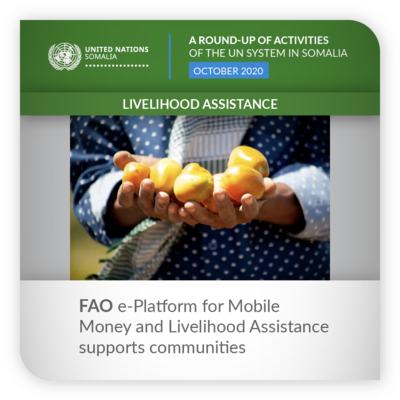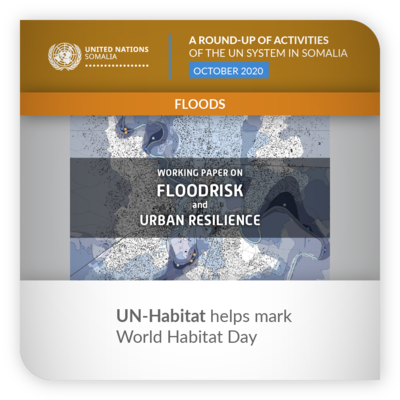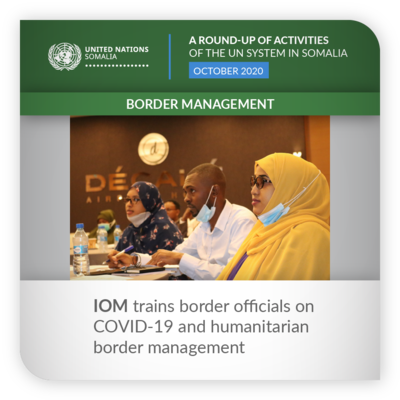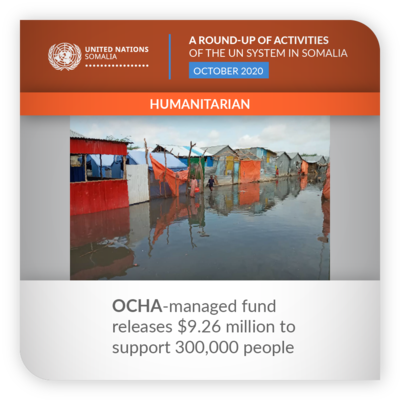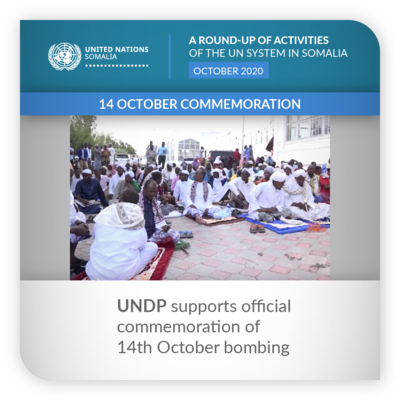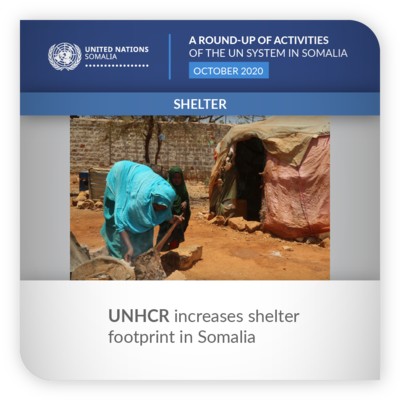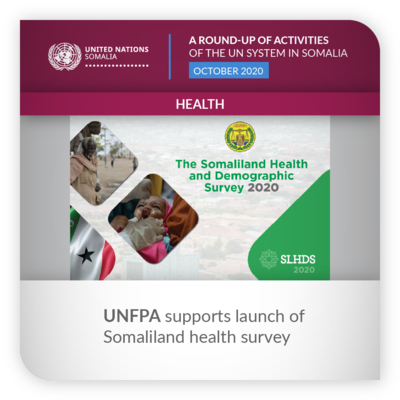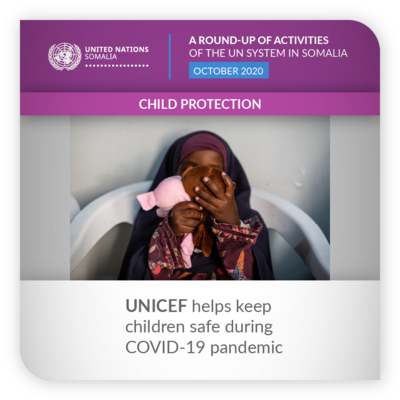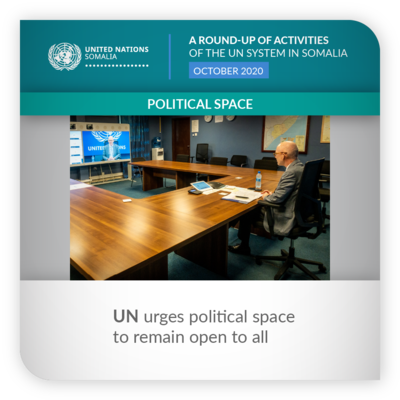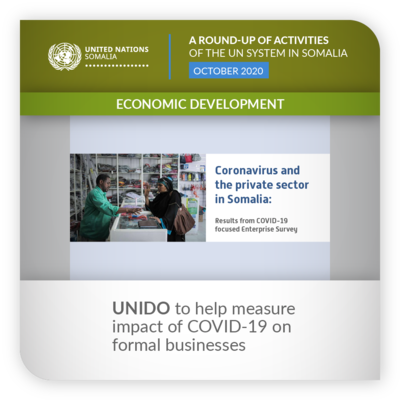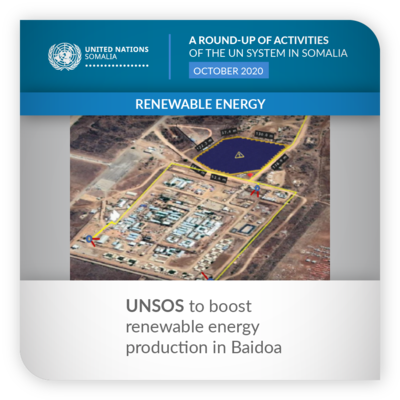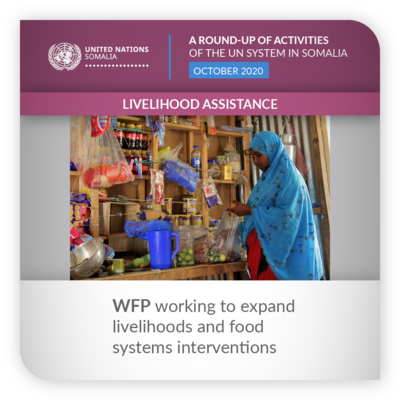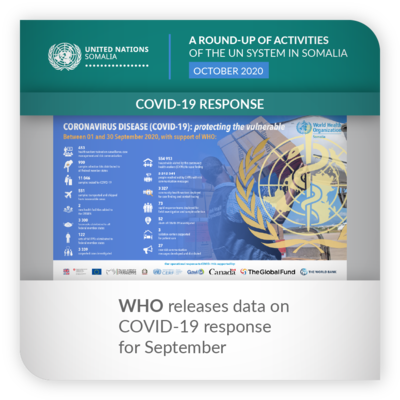A Round-up of activities of the UN System in Somalia in October 2020
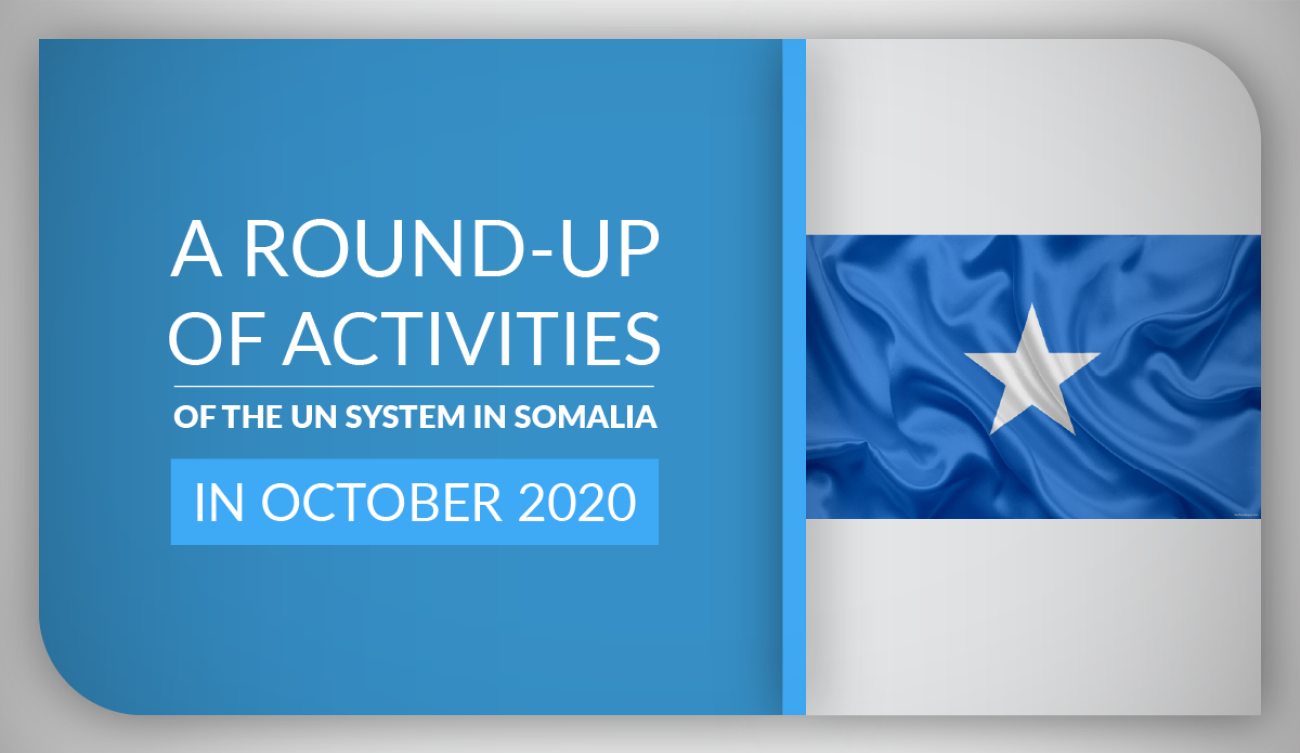
Highlights from the work of the UN in Somalia for the month of October, 2020.
|
|
Livelihood Assistance | FAO’s e-Platform for Mobile Money and Livelihood Assistance supports communities Use of FAO’s e-Platform for Mobile Money and Livelihood Assistance in Somalia is growing. It provides an ecosystem of applications to bring more efficient, convenient, inclusive and accountable assistance to the Somali people FAO serves. The ways it does this include the delivery of mobile money transfers, e-voucher livelihood support, radio trainings and podcasts, early warning and awareness messaging, and more. The e-Platform also includes two-way communication channels to keep communities informed, receive their feedback and address complaints through the toll-free hotline, bulk SMS or voice messages, as well as the new Compliance, Complaints and Feedback system, and improved reporting, particularly on the UN agency’s accountability and preventing sexual exploitation and abuse. The e-Platform is particularly bringing digital advancements to remote and rural areas of Somalia – a timely step during COVID-19, but also crucial in areas experiencing conflict, floods and other recurring hardships. |
|
|
|
Floods | UN-Habitat helps mark World Habitat Day The theme for this year’s World Habitat Day was ‘Housing for All – A Better Urban Future. To mark the occasion, UN-Habitat held an online discussion session centred on a recently-published working paper on Flood Risk Analysis and Urban Resilience in Belet Weyne. The two-hour discussion brought together the Minister of Interior and Local Government of Hirshabelle, the Governor of Hiran Region, the Mayor of Belet Weyne, a range of UN officials and the three students who developed and presented the paper from the Institute for Cooperation in Basic Habitability, as well as representatives from the same educational institution. This study has been conceived as a first step to explore long-term solutions to make the city of Belet Weyne, including its most vulnerable communities, more resilient to floods and other natural hazards. The event emphasized the importance of close coordination with various levels of the local governments in the implementation of UN-Habitat projects. |
|
|
|
Border Management | IOM trains border officials on COVID-19 and humanitarian border management IOM organized a four-day training in Mogadishu on COVID-19 and humanitarian border management. The training was attended by 40 frontline officers from Somalia's Immigration and Naturalization Department and the Ministry of Health. The training aimed to enhance prevention, cooperation and strengthen capacity in border management during emergency crises, such as the COVID-19 pandemic – in either the detection of suspected individuals or administering detentions, referrals and testing services – while maintaining awareness and respect for humanitarian aspects in migrants processing at border points. Irregular migration, coupled with health and security challenges, call for improved control of borders while, at the same time, facilitating healthier and legal migration channels that can be of immense benefit to Somalia through remittances and the protection of its nationals abroad. https://twitter.com/IOM_Somalia/status/1318195579898466304?s=20 |
|
|
|
Humanitarian | OCHA-managed fund releases $9.26 million to support 300,000 people The Somalia Humanitarian Fund (SHF) has released $9.26 million to scale up priority life-saving assistance to nearly 300,000 people affected by floods in Somalia. These critical funds, part of the SHF 2020 Reserve Allocation, will support national and international non-governmental partners operating in the Benadir, Hiraan, Lower Juba, Middle Shabelle and Lower Shabelle regions. A total of $8.18 million from the Reserve Allocation will be directed towards priority interventions to provide food assistance, non-food items and emergency shelter, support for health facilities, water services, sanitation and hygiene. |
|
|
|
14 October commemoration | UNDP supports official commemoration of 14th October bombing UNDP supported activities by the Office of the Prime Minister and the Ministry of Endowment and Religious Affairs to mark the third anniversary of Somalia’s deadliest single terrorist attack, which took place in Mogadishu on 14 October 2017. The activities included a main ceremony paying tribute to the dead and survivors, as well as government and religious leaders joining communities for discussions on Islam as a religion of non-violence and how to balance the need for justice and forgiveness on the way to building peace. |
|
|
|
Shelter | UNHCR increases shelter footprint in Somalia UNHCR has ramped up the construction of Transitional Housing Units (THUs) as it seeks to respond to the needs of vulnerable communities living in congested settlements across Somalia amid the ongoing COVID- 19 pandemic. The construction of THUs began as a pilot project in Berbera last year and has since gained ground in other regions. Currently, 100 units are under construction in Dollow, while another 150 are underway in Baidoa. In total, at least 550 units will be completed in the three regions by the end of the year giving way to sustainable and durable solutions to vulnerable returnees, internally displaced people and host communities living in makeshift shelters. Globally, UNHCR began rolling out the large-scale construction of THUs in 2015 and has since expanded to more than 40 countries in Europe, Africa, South America, the Middle East, and Asia. |
|
|
|
Health | UNFPA supports launch of Somaliland health survey With technical and financial support from UNFPA, the Government of Somaliland, through its Ministry of Planning and National Development and Ministry of Health Development held a launch to present the results of the Somaliland Health and Demographic Survey. The study is the first of its kind in Somaliland, and provides an opportunity to inform policy and provide data for planning, implementation, monitoring and evaluation of health programmes. It is designed to provide up-to-date information on health indicators, including fertility levels, fertility preferences, awareness and use of birth spacing methods, breastfeeding practices, nutritional status of children, adult and maternal mortality, maternal and child health, chronic diseases, awareness and behaviours regarding HIV/AIDS and other sexually transmitted infections. |
|
|
|
Child protection | UNICEF helps keep children safe during COVID-19 pandemic Since the onset of the COVID-19 pandemic, lockdowns and movement restrictions have been put in place, and schools have been closed. This has left many children stuck with their abusers, without a safe space. Other children have been cut off from the supportive relationships they used to rely on. There has also been an increase in reported cases of sexual violence against girls, indicating that the COVID-19 mitigation measures have left some girls and women vulnerable to domestic violence in their homes, sexual violence and rape, and other associated violations. UNICEF and the Ministry of Women Human Rights and Development have recruited, trained and deployed more than 200 social workers across Somalia to provide vulnerable children critical child protection services and link them to health, social and legal services. They play an integral part in protecting children, helping them learn, and providing them much needed connection and affection. https://www.unicef.org/somalia/stories/extraordinary-commitment-protect-every-child |
|
|
|
Political Space | UN urges political space to remain open to all As Somalia prepares to hold elections, the UN Secretary-General’s Special Representative for Somalia, James Swan, highlighted the need to ensure the country’s political space remains open, allowing for a diversity of voices and views to be expressed as part of the democratic process. To achieve this, freedom of expression, opinion, and assembly must be protected. “A vibrant political space is one that permits and encourages the participation of all segments of society – individual citizens, the media, civil society, public institutions, and political parties, among others. A democratic society must allow different viewpoints on political issues to be expressed openly, free from restriction or harassment,” he said in a statement. |
|
|
|
Economic Development | UNIDO to help measure impact of COVID-19 on formal businesses Building on a World Bank Enterprise Survey in Somalia undertaken in early 2020, and a planned UNIDO survey to assess the impact of COVID-19 on Somalia’s small- and medium-sized enterprises (SMEs), UNIDO, the World Bank and the International Finance Corporation have joined together to conduct a survey aimed at measuring the impact of the coronavirus on SME activity. In close coordination with Somalia's Ministry of Commerce and Industry and the Somali Chamber of Commerce and Industry, the survey will involve three rounds of interviews and cover 550 formal businesses in five cities – Baidoa, Beledweyne, Bosaso, Kismayo and Mogadishu. |
|
|
|
Renewable Energy | UNSOS to boost renewable energy production in Baidoa Baidoa, the largest city in South West Somalia, will soon initiate its renewable energy production, helping reduce the cost for electricity and creating jobs for the local population. This follows on from the recent awarding of a contract for the purchase of solar power to Kube Energy by UNSOS. https://unsos.unmissions.org/baidoa-set-boost-renewable-energy-production |
|
|
|
Livelihood Assistance | WFP working to expand livelihoods and food systems interventions WFP is supporting people in Somalia to build more resilient livelihoods in agricultural, agro-pastoralist and pastoralist communities. This in turn helps to strengthen local economies and the systems that produce and deliver healthy food – vital for sustainable, long-term food security in Somalia. Contingent on resources, WFP is now working to expand on its successful programming to date in this area. So far in 2020, more than 220,000 people have been supported with livelihoods interventions. These have seen 6,000 people provided with vocational skills training, over 100 water catchment sites rehabilitated, and 7,200 hectares of land benefiting from rehabilitated irrigation systems, which are helping families produce food for consumption or sale. Innovations like solar-powered cold storage systems and water-efficient irrigation technology are key, as are partnerships with all levels of Government and with other UN agencies such as FAO and UNICEF. https://twitter.com/WFPSomalia/status/1317058443723886592?s=20 |
|
|
|
COVID-19 Response | WHO releases data on COVID-19 response for September WHO released data on progress made in Somalia’s COVID-19 response for the month of September. The UN health agency is currently focusing on inter-sectoral coordination for the response to the virus, with the aim of improving surveillance for case detection, testing, and contact tracing, establishing and expanding the testing capacity of laboratories, optimizing patient-care and preparing health facilities for patient care, as well as improving information and data sharing. |

